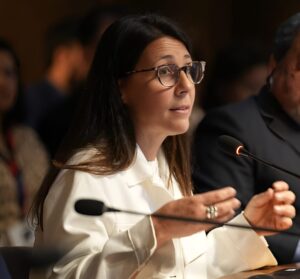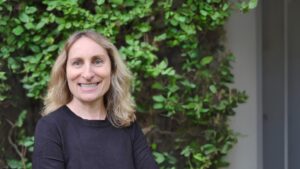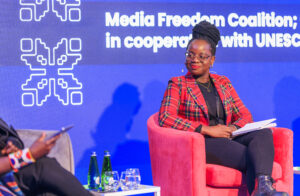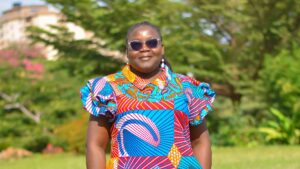Faces of Open Government: Winnifred Mahama
Media freedom is a cornerstone of open government, ensuring citizens have access to accurate information and can hold those in power accountable. In Ghana, recent elections have highlighted the critical role of media freedom in combating disinformation. During the 2024 elections, a network of at least 171 fake accounts, likely AI-generated, was used to spread misinformation on social media platforms. Under the Open Gov Challenge, Ghana has committed to protecting media freedom, a goal that reformer Winnifred Mahama, Acting Director of the Information Services Department, is making a reality. We discussed how this pledge is being turned into action.
What drew you to the work of protecting access to reliable information and media freedom in Ghana?
I was drawn to this work because I firmly believe that an informed citizenry is an empowered citizenry—one that can actively participate in governance, hold institutions accountable, and make well-informed decisions.
Ghana’s Right to InformationThe legal right to request information from the government allows the public to follow government decision-making, participate in ensuring better decisions, and hold the government accountable. Techni... Act, which passed in 2019, was a significant milestone for transparencyAccording to OGP’s Articles of Governance, transparency occurs when “government-held information (including on activities and decisions) is open, comprehensive, timely, freely available to the pub... More and public access to information. I had the privilege of contributing to its implementation through my work at the Information Services Department. It’s about bridging the gap between government and the public, ensuring that credible, timely, and factual information is accessible.
At the same time,misinformation and disinformation have become major challenges. That’s why I’m also focused on strengthening fact-checking mechanisms and media literacy initiatives, and exploring ethical ways to use AI to keep governments open and accountable.
How do you navigate the challenge of fighting misinformation while ensuring journalists and media outlets can operate freely?
Fighting misinformation while protecting media freedom requires a careful balance between safeguarding public interests and upholding the rights of journalists. Our approach focuses on three key areas: transparency, capacity-building, and collaboration.
First, we strengthen transparency by making credible information easily accessible. When accurate information is readily available, the space for misinformation naturally shrinks.
Second, we prioritize capacity-building. Public Relations Officers and media practitioners receive training on digital literacy, with an emphasis on best practices for combating disinformation while maintaining professional standards of reporting. Fact-checking is key.
Finally, collaboration is critical. We maintain open channels between government institutions, media organizations, and civil society to address misinformation collectively while reinforcing ethical standards. By fostering an environment of mutual respect and shared responsibility, we can effectively counter misinformation without compromising the vital role that a free and independent press plays in our democracy.
What key lessons did you learn about misinformation and disinformation during Ghana’s last election period?
Misinformation thrives in the absence of timely, factual content. When reliable information isn’t available, it creates a vacuum that bad actors can exploit. The core objective is to ensure that factual information is always accessible by being proactive, and in so doing, limiting the spread of false narratives.
How does Ghana’s Open Gov Challenge commitmentOGP commitments are promises for reform co-created by governments and civil society and submitted as part of an action plan. Commitments typically include a description of the problem, concrete action... support a safer digital space and media freedom?
Ghana is committed to developing national strategies to combat misinformation and disinformation in the digital space. This includes improving digital literacy, enhancing access to trustworthy information, and encouraging the responsible consumption of information across the civic space.
The Challenge commitment fits into Ghana’s broader digital agenda. Even before the commitment, we were discussing how to address misinformation and disinformation in the context of increasing digitalization. Once the commitment was formalized, it became a national priority, not just an OGP task.
We brought together stakeholders from across society: civil society, NGOs, academia, Parliament, and tech companies like Meta. The commitment has spurred wide consultation to identify the real issues and craft responses. One major gap we identified was that while existing laws like the Data Protection Act address digital issues, they don’t specifically tackle misinformation. Where such laws do exist, enforcement has been weak. The team is working on reviewing these laws and holding platforms accountable for what’s published on their sites.
Public awareness and educationAccountability within the public education system is key to improving outcomes and attainment, and accountability is nearly impossible without transparent policies and opportunities for participation ... are key too. We partner with fact-checking organizations, and during the last election, they all came together to work as one. This collective effort helped fact-check political statements in real time, creating a culture of accountability.
What concrete actions are being taken to implement this commitment?
We’ve launched a Digital Literacy Campaign that includes public education across the country. We’re also working with the Ghana Education Service to integrate digital literacy into the school curriculum so children grow up understanding the dangers of misinformation.
We’re strengthening partnerships with fact-checking organizations and pushing tech companies to take greater responsibility for the content shared on their platforms. Another key area is reviewing and refining existing laws to make sure they address the reality of today’s information environment.
What are the next key milestones to ensure citizens have consistent access to verified information?
One important step is encouraging institutions to proactively publish information, as required under Ghana’s Right to Information Law. That means not waiting for people to ask for data — but publishing fact-checked content in advance.
At our department, we run a newsroom that produces and shares verified information. We’ve also launched a “Verify First” campaign to raise awareness via social media and are developing video clips, infographics, and other materials to keep the public informed.
Combating misinformation and disinformation is a collective, global responsibility.We all need to help each other, collaborate, and implement solutions together. If we want a global society where people aren’t misled by false narratives when making decisions, we all have to work towards the same goal of getting the facts out.
No comments yet
Related Content
 Champions
Champions Faces of Open Government: Virginia Pardo
In this interview, Virginia Pardo, Director of the Information Society Department at the Agency for Electronic Government and Information and Knowledge Society (AGESIC) in Uruguay, shares how innovative and transparent…
 Champions
Champions Faces of Open Government: Valeria Torres
Meet Valeria Torres, Chief Public Management and Open Government Area at ILPES / ECLAC. Valeria has more than 20 years of experience in applied research and international processes related to…
 Champions
Champions Faces of Open Government: Sarah Wesonga
Meet Sarah Wesonga, Program Officer for Transparency and Access to Information at ARTICLE 19 Eastern Africa.


Leave a Reply